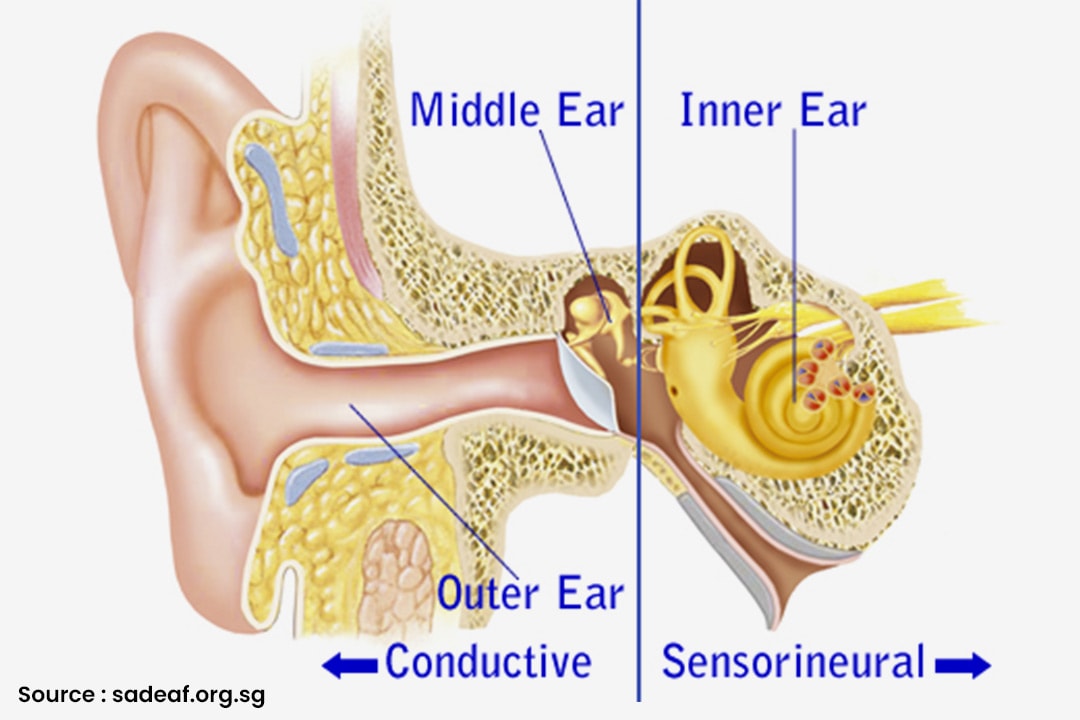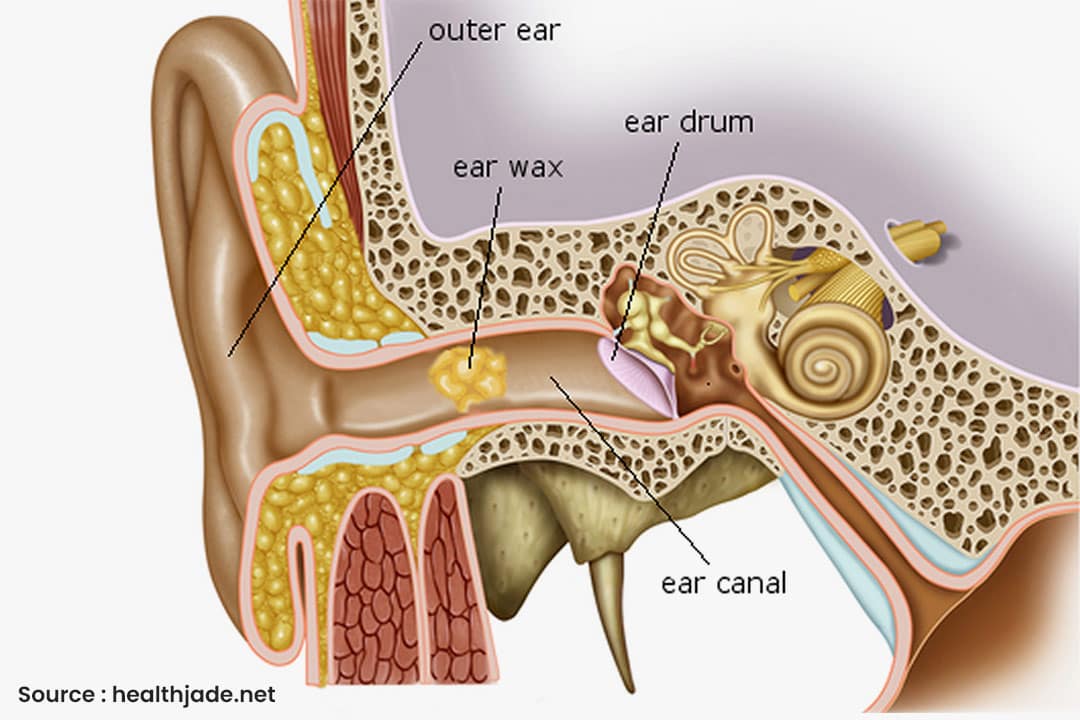
One of the most common causes of hearing loss is the constant or sudden exposure to loud sounds. However, it is not the only cause. In fact, there are three types of hearing loss – sensorineural, conductive, and mixed hearing loss – all of which are caused by different factors. In this article, we’ll dive deeper into each type of hearing loss, their causes, symptoms, and treatment options available.
Sensorineural Hearing Loss
Source : https://sadeaf.org.sg/about-deafness/introduction/
Our ears consist of three parts – outer, middle and inner ear. Sensorineural hearing loss typically occurs when the hair cells in the cochlea and/or the auditory nerve becomes damaged. It is the most common type of permanent hearing loss that cannot be medically or surgically treated as damaged cochlea hair cells cannot regenerate.
Symptoms of sensorineural hearing loss
- Muffled hearing
- Difficulty hearing soft sounds or speech
- Sudden or steady loss of hearing
- Full or stuffy feeling in the ear
- Ringing in the ear
- Dizziness
Causes of sensorineural hearing loss
- Illnesses
- Genetics
- Injury to the head or the ear
- Exposure to loud noise
- Ageing
- Drugs that are harmful to hearing
Treatment options for sensorineural hearing loss
In mild cases where your cochlea hair cells have not been completely damaged, medical therapy such as the use of corticosteroids might be able to help reduce swelling and inflammation to prevent permanent hearing loss. However, it may not be suitable for all cases. Do speak to your audiologist for more medical advice. In other more severe cases, there are no treatment options apart from the use of assistive listening devices, such as hearing aids, to help you hear better.
Conductive Hearing Loss
Source : https://healthjade.net/ear-wax-blockage/
Conductive hearing loss happens when sound waves cannot travel through your ear canal and into your inner ear. This usually occurs when there is an obstruction in the outer or middle ear. In some cases, conductive hearing loss can be reversed through medical or surgical intervention as the inner ear may still be in healthy condition. However, this depends entirely on your condition. For some, hearing loss may remain even after surgery.
Symptoms of conductive hearing loss
- Muffled hearing
- Sudden or gradual loss of hearing
- Fluctuating hearing loss
- Full or stuffy feeling in the ear
- Fluid draining from the ear
- Pain or tenderness in the ear
- Dizziness
Causes of conductive hearing loss
- Colds or allergies causing fluid to build up in the ear
- Otitis media or external otitis
- Poor eustachian tube function
- A hole in your eardrums
- Tumours
- Earwax stuck in your ear canal
- An object stuck in your outer ear
- Deformed ear canal or outer ear
- Bone abnormality in middle ear
Treatment options for conductive hearing loss
If your conductive hearing loss is caused by obstruction in the ear, the problem can be resolved simply by removing the obstruction. In more severe cases such as a deeply rooted obstruction or structural issues like bone lesions or tumours, surgery may be required. You may also get special hearing aids fitted at the hearing centre to help improve your hearing.
Mixed Hearing Loss
Mixed hearing loss occurs when you have both conductive and sensorineural hearing loss as a result of damage to both the outer and inner ear. Sound cannot travel properly through your ear canal, and the inner ear is unable to process the sound for transmission to the brain. Those with mixed hearing loss often struggle to hear soft sounds and have difficulty understanding speech.
Symptoms of mixed hearing loss
- Inability to hear sounds, especially faint sounds
- Feeling of pressure or pain in the ear
- Vertigo
- Ringing in the ears
- Your own voice sounds weird
- Other symptoms under sensorineural or conductive hearing loss as mentioned above
Causes of mixed hearing loss
- Genetics
- Ageing
- Exposure to loud noise
- Medications
- Birth conditions
- Tumours and diseases
- Head trauma
- Ear wax
- Ear infections
Treatment options for mixed hearing loss
With mixed hearing loss, only problems causing conductive hearing loss might be treated; sensorineural hearing loss cannot be reversed. Medical or surgical intervention may be required to remove the obstruction within your ear, or to correct structural issues in your ear. Hearing aids may also be fitted to help improve your hearing.
Regardless of your condition, it is critical to schedule a hearing test with a hearing centre as soon as possible if you notice any abnormalities in your hearing or your ears. Early intervention can aid in preventing severe hearing loss and/or potential cognitive decline.
The Hearing Solution Group is one of the largest hearing centres in Singapore offering a range of hearing solutions to help you hear better. Contact us today or call us at 63370090 to learn more about our services.

 Find Us
Find Us Call Us
Call Us

